Key takeaways
- Reconciliation in global politics requires genuine willingness to listen and compromise, addressing painful histories rather than relying on superficial agreements.
- Rwanda’s approach to reconciliation through community-based Gacaca courts emphasizes the importance of unity, forgiveness, and reshaping identities post-conflict.
- Challenges include lingering mistrust, the balancing act of justice and forgiveness, and ensuring that individual traumas are not overshadowed by a national narrative.
- Key lessons for global politics include the power of grassroots involvement, patience in peace processes, and the necessity of amplifying marginalized voices to deepen trust.
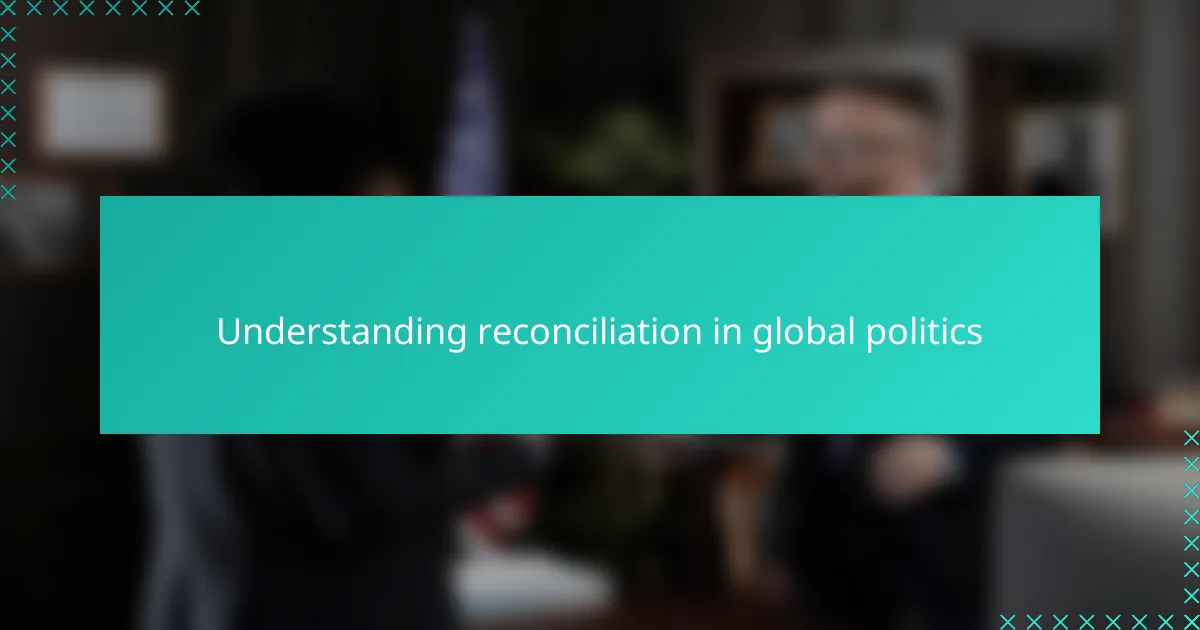
Understanding reconciliation in global politics
Reconciliation in global politics is more than just a diplomatic buzzword; it’s a complex process that often requires confronting painful histories and deep-rooted mistrust. I remember reading about how fragile this process can be, especially when emotions run high and the wounds seem too fresh to heal. Have you ever wondered why some conflicts seem impossible to resolve despite numerous peace talks?
From my experience, reconciliation demands genuine willingness from all parties to listen and compromise, which can be incredibly difficult on the international stage. It’s about building bridges slowly, sometimes one small act of trust at a time, rather than sweeping declarations of peace that lack substance. This nuanced approach often gets overlooked in favor of headline-grabbing agreements that rarely last.
In understanding reconciliation globally, it’s crucial to recognize the role of identity, narrative, and memory. How do communities redefine themselves after conflict? I think this question captures the heart of the challenge. Without addressing these fundamental issues, reconciliation remains a fragile ideal rather than a lasting reality.
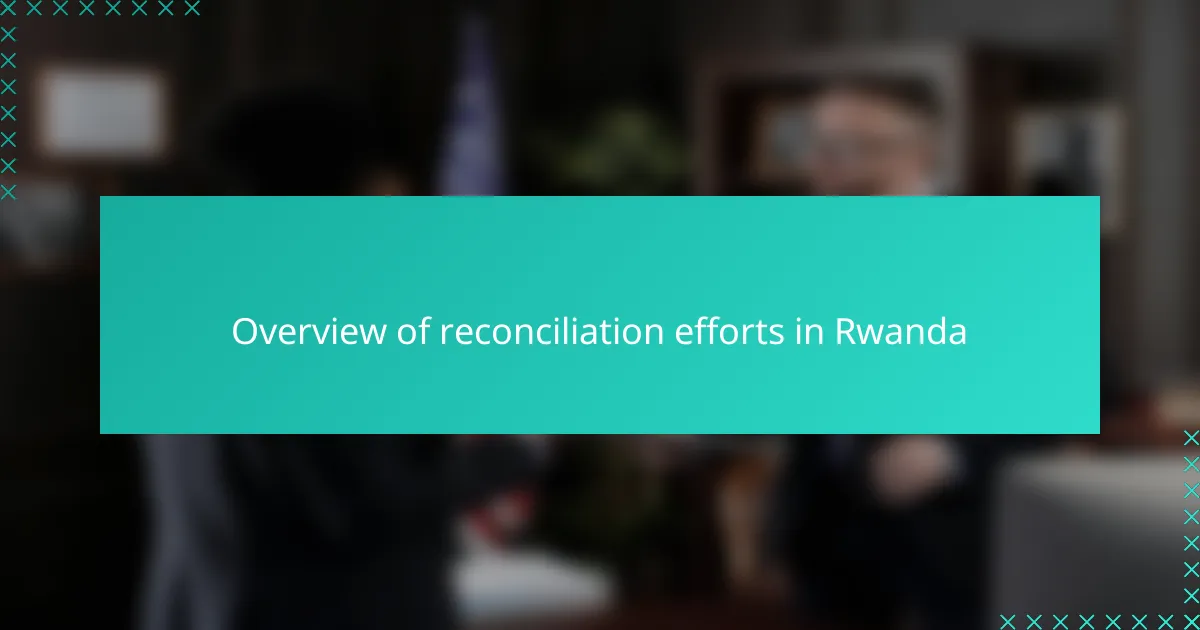
Overview of reconciliation efforts in Rwanda
When I first explored Rwanda’s reconciliation efforts, I was struck by how the country approached healing after such an unimaginable tragedy. Instead of solely relying on traditional justice systems, Rwanda embraced a community-based process called Gacaca courts, where neighbors faced each other to confront the past. Have you ever thought about how powerful—and painful—it must be to seek justice in such an intimate setting?
What really resonated with me is how reconciliation in Rwanda went beyond legal proceedings. The government promoted unity and forgiveness through education, public memorials, and national dialogues. These efforts show that rebuilding trust takes more than laws; it requires reshaping shared identities and daily interactions.
Still, I wonder how sustainable these efforts are when scars run so deep. In my opinion, Rwanda’s journey highlights that reconciliation is less about forgetting and more about transforming collective memory into a foundation for peace. It’s a reminder that moving forward is neither simple nor swift, but it’s possible with persistent commitment.
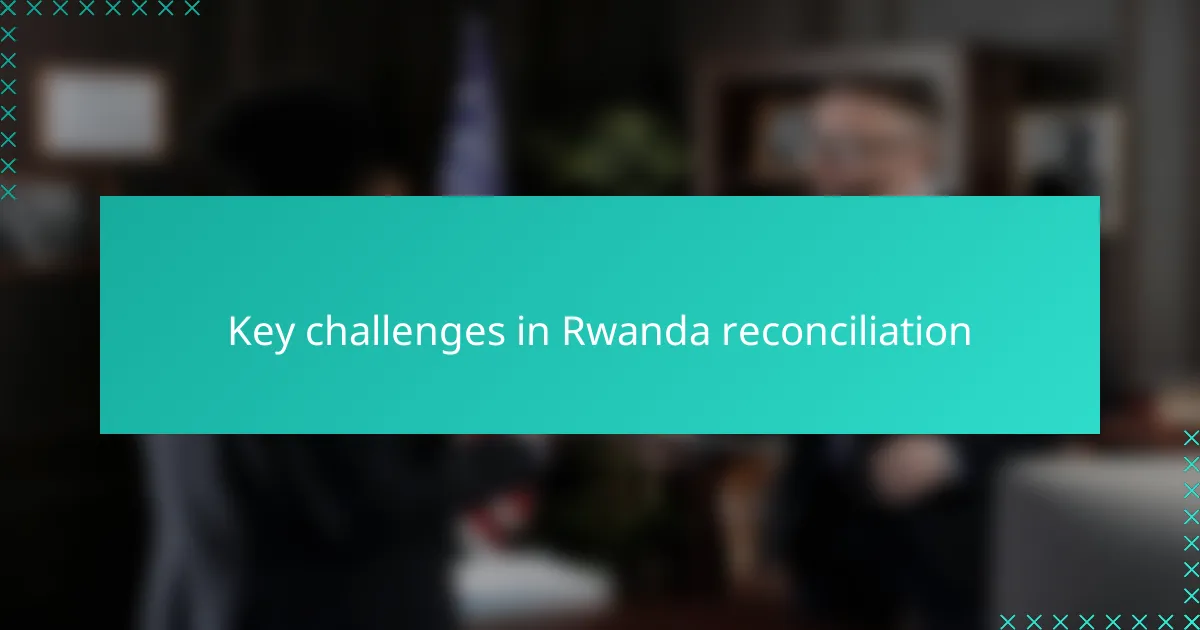
Key challenges in Rwanda reconciliation
One of the biggest challenges in Rwanda’s reconciliation, from what I’ve gathered, is the lingering mistrust between communities. Even after years of dialogue and justice efforts, I can’t help but think about how deeply trauma embeds itself in everyday life. How do you truly rebuild trust when memories of violence are passed down through generations?
Another difficulty lies in balancing justice and forgiveness. In Rwanda, the Gacaca courts were a bold step toward community healing, yet I’ve read accounts of people struggling with the idea of confronting neighbors who were once perpetrators. Isn’t it a heavy emotional burden to carry, asking victims to forgive while ensuring accountability?
Finally, I feel that the pressure to unify can sometimes overshadow individual suffering. The national narrative often emphasizes harmony, but what about those whose pain doesn’t fit neatly into a collective story? I wonder if reconciliation risks silencing personal trauma for the sake of national peace—and what that means for lasting healing.
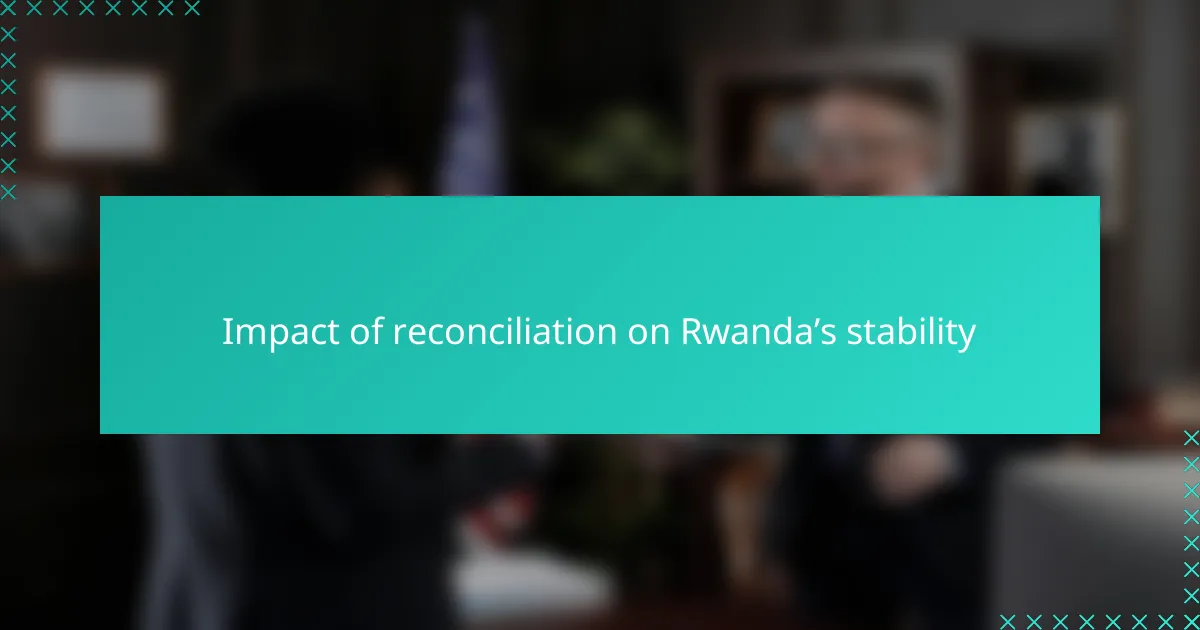
Impact of reconciliation on Rwanda’s stability
What strikes me about Rwanda’s reconciliation impact is how it has become the backbone of the country’s relative stability. I often think about how fragile peace can be, yet in Rwanda, efforts like community dialogue and shared remembrance seem to have woven a fabric sturdy enough to hold a nation together after its darkest hours. Have you considered how reconciliation transforms societies from conflict zones into places where daily life can regain a semblance of normalcy?
I’ve observed that stability in Rwanda isn’t just the absence of violence; it feels like an ongoing negotiation between remembering the past and building a future. This balance creates a cautious but genuine sense of security that allows people to invest in development and social cohesion. Still, I wonder how long this delicate equilibrium can last when wounds aren’t fully healed beneath the surface.
From my perspective, reconciliation has provided Rwanda with a platform to channel collective grief into constructive actions promoting harmony. But I can’t ignore the tension that lingers—the question of whether peace, sustained through reconciliation, always addresses all voices equally. Does lasting stability hinge on including those still grappling with unresolved trauma, or is it a compromise everybody learns to live with?
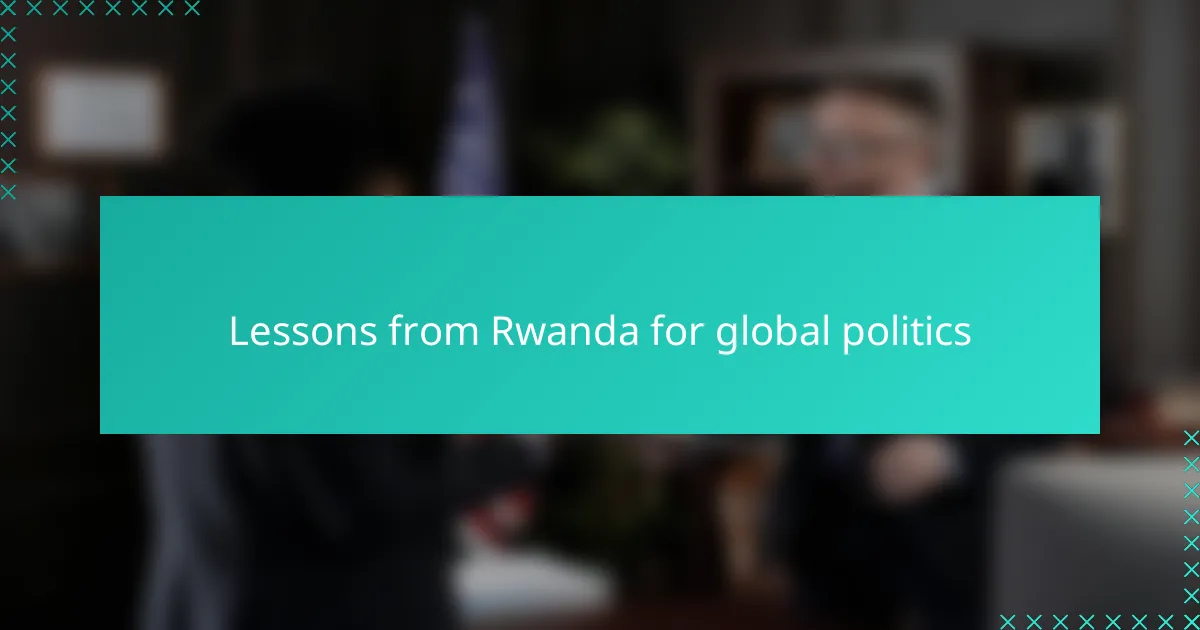
Lessons from Rwanda for global politics
When I reflect on Rwanda’s reconciliation experience, what stands out to me is the power of community engagement over top-down approaches. It makes me think—could global politics benefit more from grassroots involvement rather than solely relying on elite negotiations? Rwanda shows that healing begins when ordinary people face their pasts together, however difficult that may be.
There’s also a lesson in patience. In my years of studying peace processes, I’ve seen how the rush for quick resolutions often backfires. Rwanda’s gradual, ongoing commitment to dialogue and education tells me that real peace isn’t a checkbox but a long-term project requiring consistent care and attention.
Yet, I find myself wondering whether other countries with different histories and cultures can adopt Rwanda’s model wholesale. From what I’ve observed, context really matters. Still, the essence—that reconciliation thrives on trust, narrative reconstruction, and inclusive justice—offers invaluable guidance for global politics navigating post-conflict challenges today.
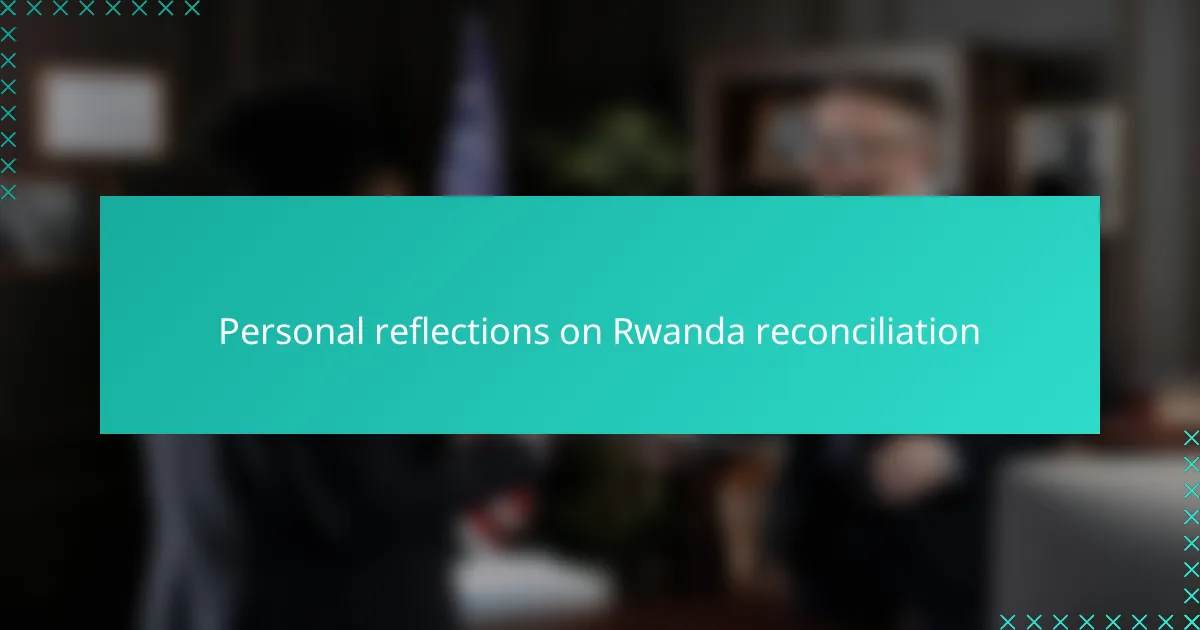
Personal reflections on Rwanda reconciliation
Reflecting personally on Rwanda’s reconciliation, I’m often struck by the courage it must take for individuals to confront neighbors who were once perceived enemies or worse. How does one even begin to untangle such personal and collective trauma? From what I’ve learned, this process goes beyond formal mechanisms—it requires deep emotional bravery that few global political efforts dare to acknowledge.
I recall a story I once read about a survivor who chose to participate in the Gacaca courts not just for justice, but to reclaim a sense of agency over her story. That vulnerability, shared so publicly, made me realize reconciliation is profoundly human—it’s messy, painful, and yet filled with moments of unexpected grace. Does this not challenge us to rethink what justice and healing look like on the ground?
At times, I find myself wrestling with the tension between moving forward and honoring the past. Can a nation truly heal if some voices are muted in the name of unity? Rwanda’s experience has taught me that reconciliation is an ongoing dialogue, a delicate balance between remembering and rebuilding. It’s not a destination but a journey that demands patience, empathy, and relentless hope.
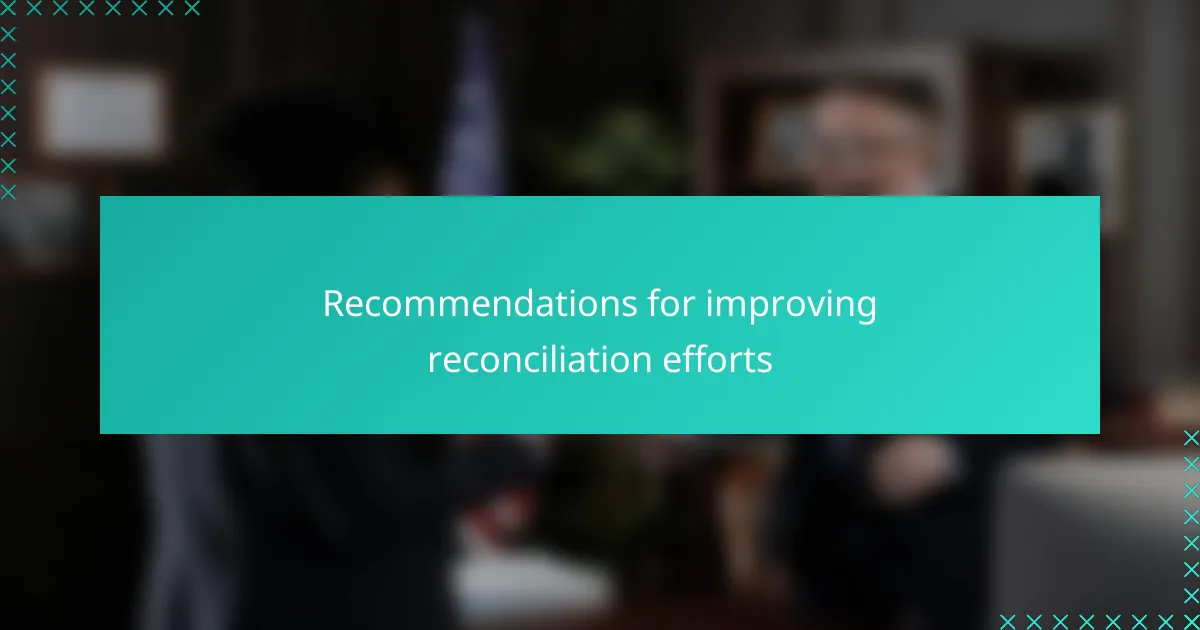
Recommendations for improving reconciliation efforts
In thinking about how Rwanda’s reconciliation efforts could improve, I keep coming back to the importance of amplifying marginalized voices. What about those who still feel left out of the national narrative—how might their stories reshape the path to healing? From what I’ve seen, fostering inclusive spaces where individual pain is acknowledged alongside collective memory could deepen trust and make reconciliation more authentic.
Another idea I find compelling is strengthening support for mental health at the community level. Reconciliation isn’t just about policies or public ceremonies; it’s about addressing the invisible wounds carried by many. I wonder if investing more in counseling and trauma-informed care would help people process their experiences more fully, reducing generational cycles of fear and mistrust.
Lastly, I believe maintaining a long-term commitment to education that explores history from multiple perspectives is crucial. When I’ve observed peacebuilding efforts elsewhere, those that embrace complexity rather than simple narratives tend to build more resilient societies. Could Rwanda benefit from expanding curricula that encourage critical reflection and empathy, preparing future generations to carry reconciliation forward with nuance?
